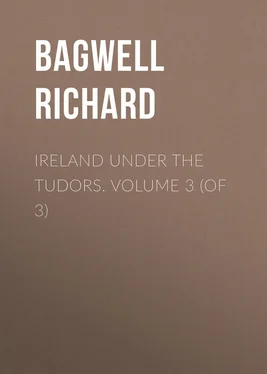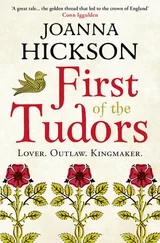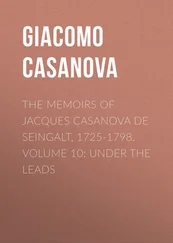Richard Bagwell - Ireland under the Tudors. Volume 3 (of 3)
Здесь есть возможность читать онлайн «Richard Bagwell - Ireland under the Tudors. Volume 3 (of 3)» — ознакомительный отрывок электронной книги совершенно бесплатно, а после прочтения отрывка купить полную версию. В некоторых случаях можно слушать аудио, скачать через торрент в формате fb2 и присутствует краткое содержание. Жанр: foreign_antique, foreign_prose, на английском языке. Описание произведения, (предисловие) а так же отзывы посетителей доступны на портале библиотеки ЛибКат.
- Название:Ireland under the Tudors. Volume 3 (of 3)
- Автор:
- Жанр:
- Год:неизвестен
- ISBN:нет данных
- Рейтинг книги:3 / 5. Голосов: 1
-
Избранное:Добавить в избранное
- Отзывы:
-
Ваша оценка:
- 60
- 1
- 2
- 3
- 4
- 5
Ireland under the Tudors. Volume 3 (of 3): краткое содержание, описание и аннотация
Предлагаем к чтению аннотацию, описание, краткое содержание или предисловие (зависит от того, что написал сам автор книги «Ireland under the Tudors. Volume 3 (of 3)»). Если вы не нашли необходимую информацию о книге — напишите в комментариях, мы постараемся отыскать её.
Ireland under the Tudors. Volume 3 (of 3) — читать онлайн ознакомительный отрывок
Ниже представлен текст книги, разбитый по страницам. Система сохранения места последней прочитанной страницы, позволяет с удобством читать онлайн бесплатно книгу «Ireland under the Tudors. Volume 3 (of 3)», без необходимости каждый раз заново искать на чём Вы остановились. Поставьте закладку, и сможете в любой момент перейти на страницу, на которой закончили чтение.
Интервал:
Закладка:
Desmond was strong for the moment, but his cruel and impolitic conduct shows that he was a desperate man. Four gentlemen of the Geraldines, who had refused to follow him were captured and sentenced by his council of war to be hanged. But the Earl said that every Geraldine who failed him should be cut in pieces, and called on as many as loved him to give the prisoner a stroke of the sword. They were accordingly ‘cut in gobbets,’ in Desmond’s presence. He attacked the O’Keefes, a loyal clan upon the upper Blackwater, killed the chief’s son and other prisoners, and took ‘the Vicar of Oskallie, and put out upon him a jury of twelve of the Earl’s men, which jury passed upon him and condemned him to death, seeing he was a true subject to her Majesty, and held office under her highness always.’ Of the whole party, O’Keefe alone was spared, and he was badly wounded. 94 94 Letter from Onor Cartye enclosed in one from the Lords Justices to Walsingham, October 3, 1582; St. Leger to Burghley and Walsingham, September 22.
From Maltby in Connaught came the only news which could possibly be called good. Old Clanricarde was at last liberated about the end of June, and a few weeks later he died at Galway of jaundice, aggravated by vexation at the sight of his ruined castle and wasted country. With his last breath he cursed his sons should they prove disobedient subjects, and thanked the Queen for her clemency. The young men soon came in and professed their willingness to have disputes settled according to law, but Secretary Fenton observed that it would be easy to make a civil faction between them, and cut off one without disturbing the province. There was little difficulty in proving that Ulick, the elder brother, was Earl, and the more difficult matter of the lands was settled quietly, and with at least some show of amity. Each competitor gave a bond in 10,000 l. to abide by the award, which was based upon the principle of equal division, first choice being in some cases given to the Earl. The whole barony of Leitrim was given to John absolutely, and the title was afterwards conferred upon him. The castles of Portumna and Loughrea were awarded to Ulick; the brothers agreed to surrender Ballinasloe to Maltby. The right of some other Burkes were defined, and in general terms it may be said that the baronies of Dunkellin, Loughrea, and Longford remained with the Earl, though some parcels were excepted. The award was accepted, but the hatred of the brothers was of too long standing to be thus appeased, and it was not long before it broke out again. 95 95 Maltby to Walsingham, June 21, 1582; Clanricarde to Maltby, July 7; Fenton to Leicester, August 13; to Walsingham, August 23. The award is in Carew , under November 17.
Famine and pestilence continued to rage through the summer, autumn, and winter of 1582. All Waterford, Limerick, and Cork, and a great part of Tipperary, were spoiled. 200 or 300 kine for the public service were as much as could be had for love or money. ‘The wolf and the best rebel lodged in one inn, with one diet and one kind of bedding.’ Archbishop Loftus being, as Spenser says, more mildly disposed, as ‘was meet for his profession,’ than his colleague Wallop, was so horrified that he advised Burghley to pardon Desmond. There might, he said, be some question of the Queen’s honour if the war of Ireland was like other wars, between one prince and another, but this was against a subject, bare, rude, and savage. The only honour to be had was by healing the sores of the poor subjects. For the famine was not confined to Munster, but ran its course even in Dublin under the eyes of the Lords Justices.
A horse of Secretary Fenton’s was accidentally burned, and was eaten by the people before it was half-roasted. Another of Wallop’s died, and was devoured, entrails and all, apparently without any preparation. It became, indeed, a regular thing ‘to eat the carcasses of dead horses, and to buy them at the soldiers’ hands.’ The Lords Justices admitted that this was a lamentable thing to happen under a Christian prince. The Irish, however, they explained, were less averse to carrion than other people; still they could not but be grieved that the soldiers should extort money for any such wares. The fact is that all were starving alike. 96 96 Barnaby Gooche to Burghley, August 27, 1582; Justice Meade to the Lords Justices, October 13; Lord Justice Loftus to Burghley, November 5; Lords Justices to Burghley, December 8; Spenser’s State of Ireland .
Sir Warham St. Leger, who hated Ormonde and all his works, attributed the evil state of Munster to the ‘cockling and dandling of hollow-hearted wretches,’ in pursuance of the Earl’s policy. In the meantime he intrigued for a capitulation on Desmond’s part. He had taken the Seneschal’s natural son – a boy of seven – ‘as like him as if he had spit him out of his mouth,’ and proposed to hang him in case the father should break out again. In the meantime he endeavoured to treat with Desmond through his means, but the rebel Earl was buoyed up constantly with the hopes of aid from abroad. The Countess persuaded him never to write anything, for fear of compromising himself with foreign princes. St. Leger was authorised to offer him his life, restraint without any imprisonment in some part of England or Ireland, and hope of further mercy for himself and child; but a full restoration was not to be thought of. There seems to have been little sincerity in the negotiation, though doubtless both the Queen and Burghley would have been glad to avoid further expense; and Ormonde, on his arrival, found the state of affairs unaltered. St. Leger foretold his failure. The protectees would fail him, and he would have enough to do to keep his own. ‘He is,’ he said, ‘a person most odious of all men to Desmond’s friends… It is death to all the lords and chieftains of both factions to have English government come among them, for they know that if English government be established here, their Irish exactions is laid aground; the which to forego they had as leave die, such is their devilish consciences.’ How true was the prophecy as to Ormonde’s failure will appear hereafter. 97 97 St. Leger to Fenton, October 31; to the Queen and to Burghley, November 26, 1582; Burghley to Loftus and Fenton, and to St. Leger, December 9; St. Leger to Burghley and Walsingham, February 2, 1583.
After many delays Ormonde was at last despatched, and 1,000 men were assigned to be under his orders in Munster. He had power to promise pardon to all rebels except Desmond himself. His pay and allowances were calculated on a liberal scale, amounting in all to over 4,000 l. a year, and his rents due to the Crown were suspended until he should be able to make the lands profitable. Much was left to his discretion. Thus, rebels who surrendered might have a promise of their lands in consideration of a reasonable rent. 300 men were sent from Devon and Cornwall, Cheshire and Lancashire, Somersetshire and Gloucestershire, to fill up the gaps in the Irish garrisons. A large store of provisions was sent; but, on landing, Ormonde found Waterford, Tipperary, Cork, and Limerick in such a state that he thought it would not last for two months. His personal allowance was fixed at 3 l. a day, but Wallop at once made a difficulty about paying this and many other claims. Ormonde, he said, was already too great for Ireland, and desired to be absolute in his government. Money no doubt was scarce in Dublin, but the Vice-Treasurer was advised to satisfy the Earl’s demands. The new governor lost no time in preparing for action, but he complained bitterly that companies were defective, that troops of horse were mounted on borrowed ponies, and that he was expected to perform impossibilities. He was ordered not to have more than four per cent. of Irishmen in any band; whereas Englishmen could not be had, and the Irish were the best shots. 98 98 Earl of Ormonde’s demands, &c., November 1582; Walsingham to Wallop, December 6; Burghley to the Lords Justices, December 8; Rate for 1,000 men to be sent into Munster, December 15; Lords Justices to Burghley, January 5, 1583; Ormonde to Walsingham, January 27; Wallop to Walsingham, February 7 and March 6; Minute for the Lords Justices, March 5; Ormonde to the Lords Justices, March 20. Ormonde left London, or Windsor, December 22, and landed at Waterford (viâ Milford) January 21, having been long hindered by storms.
Интервал:
Закладка:
Похожие книги на «Ireland under the Tudors. Volume 3 (of 3)»
Представляем Вашему вниманию похожие книги на «Ireland under the Tudors. Volume 3 (of 3)» списком для выбора. Мы отобрали схожую по названию и смыслу литературу в надежде предоставить читателям больше вариантов отыскать новые, интересные, ещё непрочитанные произведения.
Обсуждение, отзывы о книге «Ireland under the Tudors. Volume 3 (of 3)» и просто собственные мнения читателей. Оставьте ваши комментарии, напишите, что Вы думаете о произведении, его смысле или главных героях. Укажите что конкретно понравилось, а что нет, и почему Вы так считаете.












